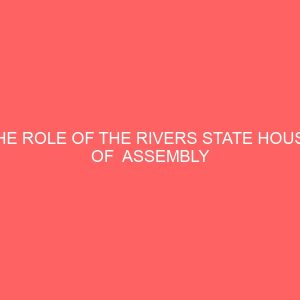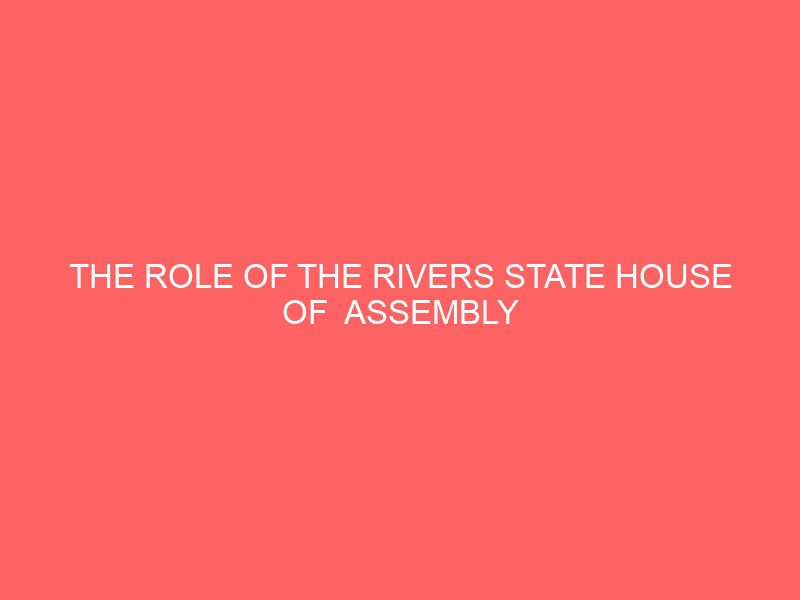Description
CHAPTER ONE
INTRODUCTION
1.1. BACKGROUND OF THE STUDY
This research is on the role of the rivers state house of assembly in conflict management, 1999-2011. Sections 4(1) and 4(7) of the 1999 Constitution of the Federal Republic of Nigeria provide for the law-making function of the legislature at both the Federal and State levels.
Consequently, there is a bi-cameral National Assembly made up of the Senate and House of Representatives at the Federal level, and the 36 unicameral State Houses of Assembly, all legislating for peace, order and good governance of the Federation and States respectively (Egobueze, 2010:4). Since the return to democracy in Nigeria in 1999, four Legislative
Assemblies have been elected at both the Federal and State levels. These are 1999-2003, 2003-2007, 2007-2011 and 2011-2015. In each of these elections, thirty two legislators were elected to the Rivers State House of Assembly. This is in conformity with Section 91 of the 1999 Constitution of Nigeria which states, inter alia:
Subject to the provisions of this Constitution, a House of Assembly of a State shall consist of three or four times the number of seats which that State has in the House of Representatives divided in a way to reflect, as far as possible nearly equal population: Provided that a House of Assembly of a State shall consist of not less than twenty-four and not more than forty members (FGN, 1999).
The Rivers State House of Assembly is a unicameral legislature with thirty – two Member. The 1999-2003 Assembly was composed of three political parties viz; the Peoples Democratic Party (PDP), All Peoples Party (APP), later All Nigerian Peoples Party (ANPP) and Alliance Democracy (AD), while all the others have had only members of the Peoples Democratic Party (PDP) without an opposition party member in the House. The House currently has the following Officers: the Speaker, Deputy Speaker, House Leader, Deputy House Leader, House Whip and Deputy House Whip. Worthy to note is that all other Members of the House are Chairmen of Committees and each of them is a member of not less than four Committees.
The legislature is the yardstick for measuring the views of the people in a democracy. It is also the watch dog of public funds in that it not only appropriates for the State but scrutinizes how the funds so appropriated are spent. Finally, the legislature is constitutionally mandated to direct investigations into the conduct of the affairs of State, institutions, organizations and individuals within the State. In other words, the legislature has the right to summon any public or private organization or individual to appear before it to answer questions based on petitions received and or motions made. The Rivers State House of Assembly as a legislative body upholds these mandates. The tripartite functions of the legislature namely, Representation, Legislation and Oversight are central to this research because they manifest in the intervention of the legislature in conflict management.
It is important to note that the political landscape of Nigeria particularly in the Niger Delta has been characterized by one conflict or the other. Most of these conflicts have either been for economic, political, religious and or other social reasons. Executive, Legislative and Judicial means have been adopted in the resolution of these conflicts. From 1966 when Isaac Adaka Boro formed the Delta Volunteer Force (DVF) to confront the Nigerian State against perceived oppression and marginalization till date, the oil rich Rivers State has witnessed several conflict situations that have to do with oil, economic wealth, politics and the misapplication of the huge resources that come with them. Some of these conflicts were the Ogoni crises which resulted to the death of prominent Ogoni leaders including the environmentalist, Ken Saro Wiwa in the 1995, the Umuechem crisis; and the Ogbakiri crises. Since the return to civilian rule in 1999, the State has witnessed not less than forty five conflicts that culminated in the loss of many lives and properties. Prominent among these are Emuoha Civil Disturbances 1999, 2001, 2002, 2010; Ogbakiri communal crisis 1999, 2011; Choba-Wilbros crisis 1999; Okrika crisis 2002-2003, 2007; Tombia crisis 2002-2003; Omuma crisis 2003, 2007-2011 among others. The above conflicts in the oil rich State have majorly been between the government forces and some militant elements on one hand and inter or intra communal on the other hand. The conflicts have been mainly attributed to economic and political factors, that is, quest for economic wealth as well as political power. Conflict is not only a threat to human rights, but also a barrier to development. Violent conflicts can reverse decades of development gains. The costs of preventing conflicts are far lower than the costs associated with recovery. Effective and responsive programming in the field of democratic governance can be a major component of work to prevent violent conflict and support post-conflict peace building. Through their everyday work of representing constituents, law-making, oversight of government activities, and the process of political contests, Legislative Houses have a critical role to play in conflict prevention and resolution. Legitimately, elected Houses provide a forum for the concerns of diverse societal groups to be aired and incorporated into processes of dialogue, reconstruction and conflict resolution. The legislature is a natural place for mediation, where competing points of view can be represented. By providing a forum to debate contentious issues peacefully, the House helps prevent violent political conflicts. Such dialogue can help to prevent conflicts by generating an understanding of the challenges facing society, and a consensus on how to address them. In this way, the legislature can mitigate the divisions caused by conflicts by developing an inclusive vision for society, based on commonly held values and goals.
For democratic governance to peacefully manage conflicts, Executive bodies must function efficiently and effectively. This requires Legislative oversight of the Executive‘, a core Legislative function. The Legislature connects citizens with the State and holds governments to account for their actions or inactions on critical issues that have bearing on conflicts. For instance, the Legislature can ensure that government works to resolve a conflict between the University Unions and the Executive by providing in the Appropriation Law, good remuneration for the University workers. Also, in order to check restiveness of youths, it could eradicate the seeds of conflicts by advocating for pro-poor policies, monitoring the implementation of poverty reduction strategies, and by ensuring that the appropriation — and its implementation — respond to popular needs and expectations. The Legislature also promotes dialogue on budgetary issues and communicates the reasons behind the allocation of resources, to ‗manage‘ constituents‘ expectations and minimize conflicts that result from competition for scarce resources.
Legislative oversight of the security sector is a crucial element of the balance of power within a democracy. Legislators have a critical role to play in monitoring the use of the State budget for security sector expenses and in reviewing draft laws on security issues. As citizens‘ representatives, they could relay citizen‘s concerns and priorities to be incorporated into security laws and policies.
It is essential to state that the Executive has always been a dominant player in conflict resolution and creating political stability. However, the role of the Legislature has most often been considered tangential. More studies have been done on the Executive in general and the Legislature at the Federal level than the State, but none of these studies featured the role of the Legislature in conflict management. Okoosi-Simbine (2007:9) avers that a logical study of the Legislature in contemporary Nigeria is the National Assembly, where empirical indications of a malfunctioning Legislature are regularly featured in Nigerian dailies. Some major studies on the Legislature in Nigeria and germane to our research are (Alabi and Egbowole, 2010; Olusanya & Akindele, 1986; Ayodele, 2002:12-24; Ayua, Guobadia and Adekunle, 2000; Bello Imam, 2004:406-426; Dunmoye, Njoku and Aluba, 2007; Egobueze, 2010; Egwu, 2005; Guobadia and Azinge, 2007; Ogwu and Alli, 2007; Mbah, 2007; Nwabueze 2007; Nzeribe, 2004).
It is therefore important to the discipline of political science that more empirical research be produced on the contributions of the Legislature to conflict management and political stability generally. Mishler and Hildreth (1984:26-27) are correct about studies of the Legislature when they note that:…the available research tends to be impressionistic and based on case studies of one or at most a small group of nations having typically similar legislative systems, political cultures, regime types, and levels of economic and political development. Even then, the conclusions are inconsistent and contradictory.
Consequently, we still may not understand whether, to what extent, and under what conditions legislatures contribute to political stability or its breakdown. The question still is, as Wahlke (1971:165) posed it, “how do representative bodies contribute to the generation and maintenance of support? In what respects and for what particular aspects of the task are they superior to non-representative institutions?”
This work attempts to redress this neglect by examining the critical role that the Legislature plays in conflict management focusing on the Rivers State House of Assembly between 1999 and 2011. This covers the period between the reintroduction of democratic rule on 29th May, 1999 to 29th May, 2011 when the 6th Assembly came into being. That is, it covers the 4th, 5th and 6th Assemblies. The period is associated with years of uninterrupted civil rule, based on the presidential system at all tiers of government in Nigeria. In a nutshell, this is a study of the role of the legislature in creating political stability through its role in conflict management in Rivers State.
1.2. STATEMENT OF THE PROBLEM
It is generally assumed by both political scientists and policy makers that conflict management is principally the role of the Executive and Judicial arms of government. The role of the Legislature in conflict management is assumed to be incidental, often limited to enactment of legislations to give effect to negotiated agreements or curb the proliferation of conflicts. This is assumed to be the case for both international and domestic conflicts. In international conflicts, the executive arm of government takes the lead in foreign policy, especially in treaty making and implementation. Although in some jurisdictions like Nigeria, the Legislature is required to domesticate international treaties before they come into effect, in reality, once treaties have been entered into, their domestication becomes almost a routine exercise. On the other hand, in domestic conflicts, it is assumed that the Executive and Judiciary take the lead. This is so for a number of reasons; first, it is principally in the process of implementing government policies that most domestic conflicts arise and the Executive arm, as the policy implementation arm of government, is at the fore of managing these conflicts. Secondly, as the arm of government which principally incarnates the capacity and authority of the state, the Executive arm has responsibility to manage conflicts and create political order and stability. Thirdly, the Judiciary is central to conflict management because of its role as the interpreter of policies and legislation. Finally, the role of the Legislative arm in conflict resolution is subdued because as a body, it incarnates the diversities of society and it is precisely such diversities that create the fault lines of conflicts in the first place. Some scholars however argue that:
Recognizing the minimal role played by most legislatures in the lawmaking and policy processes, scholars increasingly have attempted to account for the prevalence, persistence, and apparent regenerative capacity of legislative institutions in terms of their putative contributions to political stability. The argument usually advanced is that by providing an institutional forum for the representation of societal diversity and the expression of dissent, legislatures contribute to the integration of society and the legitimation of both government and regime. In so doing, legislatures are credited with reducing levels of political conflict, rendering conflict more manageable, and mitigating the effects of conflict on government and regime (Mishler and Hildreth, 1984:25-26).
In support of the above school of thought, Loewenberg and Patterson (1979, 65-67) are careful to point out that:
Legislatures are not the only or even the most important institutions that perform these functions. They also note that some legislatures perform these functions better than others and that in some circumstances legislatures may even exacerbate political conflict and undermine stability. Nevertheless, they conclude that when political leaders collectively deliberate on political issues in public, that they do so, how they do so, and to what effect they do so have profound consequences for the survival of political system.
In countries divided by conflicts, and where the management of conflicts by the executive and judicial branches of government have been ineffective, there is an urgent need for reconciliation to enable all communities to work together towards a common vision of a peaceful future. The Legislature can exercise a leadership role in a broad reconciliation process by building relationships across party lines and by bringing to bear its oversight functions. Also, they can use their legislative role to promote reconciliation, for example by drafting laws that address grievances in representation (e.g. electoral or constitutional reforms), human rights legislation or minority rights legislation that lessens animosities between communities. By participating in the legislative process in a spirit of co-operation to produce such laws – and by strengthening judicial independence to support their implementation – parliaments can play a key role in supporting conflict prevention. In all, the role of the legislature in conflict management could be linked to the concept of Alternative Dispute Resolution (ADR).
This research examines the role of the Legislature in conflict management in a conflict prone emerging democracy like Nigeria. It seeks to explain the rising role of the legislature in conflict management in Nigeria. Dominant paradigms frozen in the assumption that the Legislature only makes laws completely ignore the dynamic and changing role of that organ of government, particularly in situations where traditional institutions of conflict management are either underdeveloped or ineffective. The legislature as the creator of institutional rules and the collective democratic will of the people increasingly plays a role in conflict management in such contexts. In fact as Meny (1993:186) suggests, the role or state of the legislature is a crucial indicator of the state of health of democratic government.
The nature and dynamics of conflict and the processes of conflict management differ from one institution to the other and from sector to sector in a society. However, the driving forces for conflictual relationships remain largely the same. Nieuwmeijer and Cloete (2001:4) opine that:
The driving forces for conflictual relationship consist of the perceptions by one or more individuals or groups of conflicting or diverging values, aspirations, needs or interests in society, that hamper the full realization or fulfilment of one‘s own values, aspirations, needs or interests. If these perceptions are intense enough, they are transformed into actions to redress the perceived problem by mobilizing resources to promote one‘s own interests at the cost of others, resulting in an escalation of tension among the parties concerned.
The specific issues around which conflict revolves, the manifestations of the conflict and the conflict management strategies and processes, however, are different in the social, cultural, organizational, economic, technological and political sectors of society. It is instructive to state that the management of conflicts falls basically with the responsibilities traditional to the executive and the judiciary. However, it is sad to note that these institutions have not been able to adequately stem conflicts. Instead, conflicts have deepened in Nigeria and indeed Rivers State. As a result of this perceived inefficiency, Legislative bodies as the broadest representatives of the people have been inundated with petitions from the public about conflicts. The implication of this is that there is the growing trust and confidence by the people in the ability of the Legislature to resolve conflicts. Therefore, the relevant question is not whether Legislatures contribute to political stability or change: some undoubtedly facilitate stability; others promote change; still others have little effect on either; and all are susceptible to reciprocal influences from their environments, that is, the political system.
Nonetheless, the important question, rather, is under what conditions are Legislatures likely to contribute to stability as measured by conflict management and to what extent is this feasible? What combination of legislative structures and procedures is most conducive to political stability, under what circumstances, in what social, economic, and political settings are citizens more likely to trust the Legislature with conflict management than they would with the Executive and the Judiciary? To this end therefore, this research seeks to answer the following questions:
- Does the direct interest of members of the Legislature in conflicts lead to increased involvement of the Legislature in conflict management?
- Does the failure of the Executive and Judiciary to reduce conflicts increase the involvement of the legislature in conflict management?
- Does the involvement of the Legislature in conflict management enhance political stability?
1.3. OBJECTIVES OF THE STUDY
The general objective of this study is to explain the rising role of the Legislature in conflict management and, therefore, in creating political stability in emerging democracies like Nigeria. More specifically, this study seeks to:
- Investigate whether the direct interest of the members of the Legislature in a conflict would lead to the increased involvement of the Legislature in conflict management.
- Ascertain whether the failure of the Executive and Judiciary to reduce conflicts would increase the involvement of the legislature in conflict management.
- Determine whether the successful management of conflict by the Legislature would enhance political stability in Rivers State
- Make recommendations that would engender peace and stability capable of stemming conflicts and promoting good governance in the State.
1.4. SIGNIFICANCE OF THE STUDY
The empirical significance of this study is that it treats a current and socially relevant subject. It is important to state that the Legislature not only represents the masses, but also enacts laws and conducts oversight especially on the Executive branch of government, which implements the laws made. Through its power of the purse, motions/resolutions as well as bills, the legislature could stem the tide of bad governance and redirect the focus of government to be transparent and very accountable to the people, this the World Bank argues, is relevant in modern democracy.
There is dearth of empirical theoretical knowledge on the Legislature in Nigeria‘s politics, because of the long period of military rule, which invariably was characterized by the sack of the Legislature and its replacement with military (decrees) making structures with different nomenclatures at different times in our political history. These antidemocratic forces were features of governance in Nigeria till the rebirth of democracy in May, 29, 1999, when all democratic institutions were restored with Chief Obasanjo as the President and Commander-in-Chief of the Armed Forces of the Federal Republic of Nigeria. Most literature dwelled essentially on the Executive which had fully evolved ignoring the position of the Legislature, study on the Legislature is currently agitating the mind of scholars and provoking discourse in social science. Furthermore, the major theoretical significance of the studies lie essentially in filling a major theoretical gap on the rising role of the Legislature in conflict management.








Reviews
There are no reviews yet.